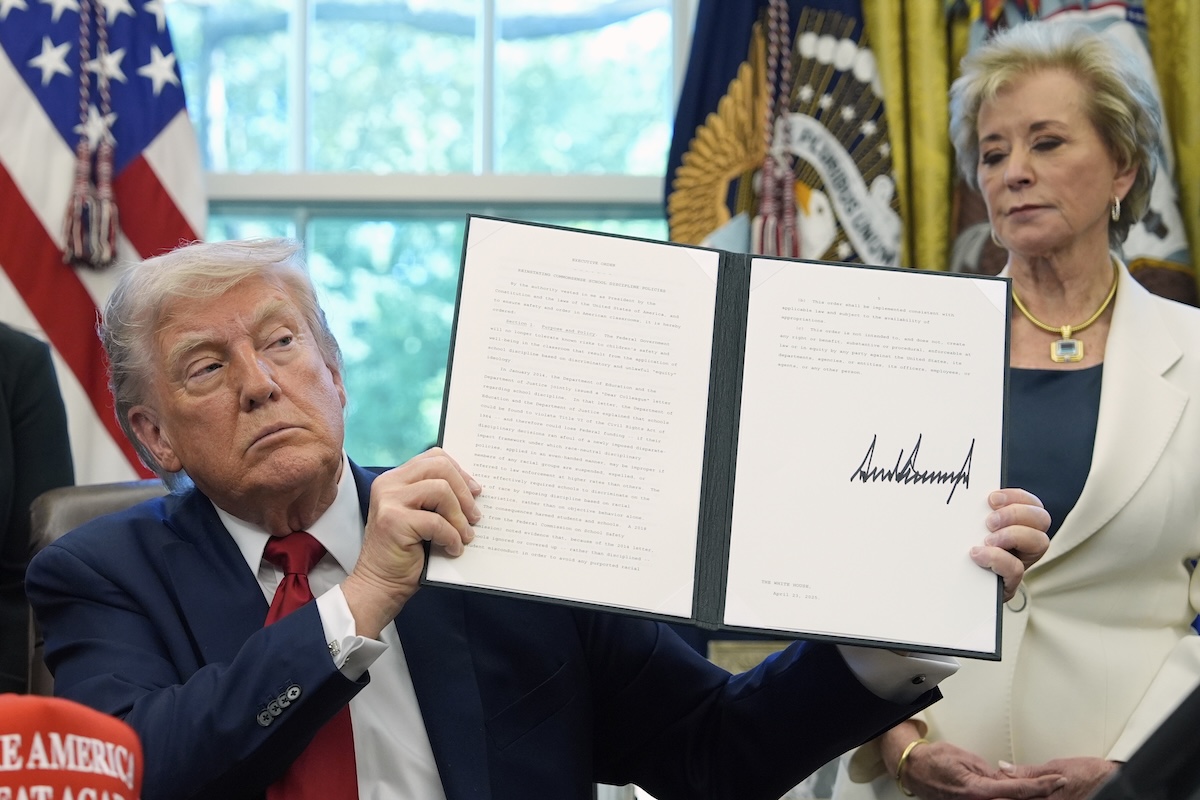

Key points
- More than a dozen cities, unions and nonprofits have sued the Department of Education over a rule that could allow the secretary to exclude certain public employers from the Public Service Loan Forgiveness Program.
- Prosecutors say the rule is illegal and politically motivated, accusing the Trump administration of targeting employers whose jobs it opposes.
- The lawsuit, filed in Massachusetts federal court, seeks to uphold PSLF’s bipartisan promise to workers at all government agencies and 501(c)(3) nonprofit employers.
A coalition of major American cities, labor unions and nonprofit organizations I filed a lawsuit(PDF) on Monday against Education Secretary Linda McMahon and the Department of Education, accusing the Trump administration of turning the student loan forgiveness program into a political weapon.
The complaint, filed in the US District Court for the District of Massachusetts, seeks to overturn a new rule that redefines what constitutes a crime. “Qualified employer” under Public Service Loan Forgiveness (PSLF) program. Plaintiffs say the change violates federal law and the First Amendment by allowing the Department of Education to cut off debt relief for workers at public or nonprofit institutions that the administration does not favor.
The plaintiffs include the cities of Boston, Chicago, Albuquerque, San Francisco, and Santa Clara County, along with leading labor unions such as the American Federation of Teachers, AFSCME, and the National Education Association. National advocacy groups (National Council of Nonprofits, National Association of Social Workers, and several legal aid and immigrant rights organizations) joined the cause, represented by Borrower Protection and Democracy Forward.
Their basic case is simple: They claim the new rule gives the federal government unfettered power to punish employers based on political ideology.
“ED’s PSLF ruling is an illegal attempt to use the federal government as a weapon against its own people” – Persis Yu, Managing Consultant at Protect Borrowers
Would you like to save this?
What the new PSLF rule will do
The rule behind the dispute stems from a March 2025 executive order titled “Restoring Public Service Loan Forgiveness.” The Department of Education is authorized to exclude any government or non-profit employer.”– Engaging in activities with a fundamental illegal purpose.“
The regulation lists several examples of this activity:
- Assistance with violations of federal immigration law
- Supporting terrorism
- Engaging in child abuse or unlawful discrimination
- Violating the state’s laws against disturbing public order
The administration framed the change as a way to prevent taxpayer dollars from supporting what it called “anti-American activists.” But critics say the language is so vague that it could be used to target sanctuary cities, immigrant rights nonprofits, or health care providers who provide gender-affirming care — all entities the administration has already singled out.
Under the final rule, published on October 31, 2025, an employer could lose PSLF eligibility if it fails to certify that it does not engage in such activities, or if the Secretary independently determines that it does. The deprivation will continue for ten years.
The department claims the regulation improves “program integrity,” but plaintiffs say it directly conflicts with the Higher Education Act, which explicitly identifies all government employers and 501(c)(3) nonprofits as eligible employers, without exception.
Public Service Loan Forgiveness Date
Congress created the PSLF in 2007 with bipartisan support to help borrowers burdened by student debt pursue careers in teaching, health care, social work, and public safety – jobs that often pay less than private sector work. Borrowers who make 120 qualifying payments while working full-time for a government or nonprofit employer can have the remainder of their federal loans forgiven.
According to data from the Ministry of Education. more than million borrowers I’ve already received more than that 70 billion dollars In loan forgiveness since the start of the programincluding hundreds of thousands of teachers, nurses, firefighters and city workers.
Plaintiffs argue that the new rule turns this structure on its head by injecting politics into what had been a neutral and categorical standard. They point out that the law was written to encourage service “in any government or 501(c)(3) employer” — not in those deemed acceptable to anyone occupying the White House.
The complaint asserts that the department “does not have the authority to investigate or disqualify an employer” and that the rule is “arbitrary, capricious, and contrary to law.”
The legal case challenging the PSLF rule
The 78-page complaint includes numerous claims under the Administrative Procedure Act and the U.S. Constitution. It argues that the department’s rule exceeds its legal authority under the Higher Education Act, violates free speech protections by targeting unfavorable viewpoints, and denies due process by introducing vague and subjective standards.
Plaintiffs also point to procedural flaws in how the department managed the rulemaking — compressing public negotiations into three days before the Fourth of July holiday, incorporating stakeholder groups, and rejecting nearly 14,000 public comments opposing the proposal.
According to the filing, the department provided no evidence that PSLF-eligible employers engaged in “illegal activity” and ignored congressional letters warning that it lacked the authority to rewrite the program’s eligibility criteria.
The lawsuit also alleges a broader pattern of political retaliation by the administration against nonprofit and local government entities that oppose its policies on immigration, civil rights and public protest.
In comments submitted during the rulemaking process, the City of Albuquerque warned that losing PSLF eligibility “would likely create an untenable employment crisis,” as employees may leave for eligible employers rather than risk the prospects of having their debts forgiven. Nonprofits echoed these concerns, saying the uncertainty alone could make hiring more difficult in sectors like education, health care and social services.
The National Association of Community Health Centers wrote that PSLF “is vital to the physicians and staff who provide care to nearly 34 million Americans” and that removing eligibility could push workers out of primary care roles, exacerbating shortages.
For nonprofits operating on limited budgets, PSLF has long been a critical benefit used to attract and retain staff. Without it, many organizations could lose experienced employees or be forced to offer higher wages they can’t afford, the lawsuit says.
What will happen next?
The lawsuit asks the court to strike down the rule and restore the previous definition of PSLF, which has remained largely unchanged since 2008. Because the rule was finalized on October 31, it is scheduled to take effect on July 1, 2026 unless the court issues a preliminary injunction. It’s important to realize that the rule will only affect borrowers moving forward — it does not retroactively eliminate any qualifying payments.
If successful, the lawsuit could reaffirm the original categorical approach to PSLF eligibility and determine whether future administrations can change that promise through implementing rulemaking.
Case, National Council of Nonprofits et al. v. McMahon, highlights how intertwined student loan policy is with national politics. For millions of public-service borrowers, the outcome may determine whether their debt relief depends on the work they do – or the administration in power.
Don’t miss these other stories:
Government shutdown and student loans explained (2025 update)
Can President Trump reverse student loan forgiveness?
Can Trump ban some workers from PSLF?
Editor: Colin Greaves
The article Cities Sue Over PSLF Employer Rule Change appeared first on The College Investor.





